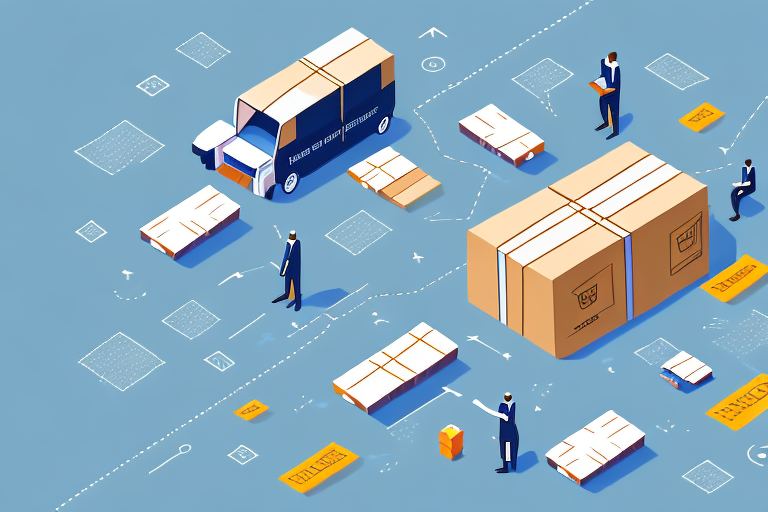Unlock the Potential of Courier Business Opportunities
Courier services have been essential in facilitating the movement of goods and information for centuries. Today, the courier industry is experiencing significant growth, driven by the rise of e-commerce and the increasing demands of a globalized economy. This article explores the various aspects of starting and managing a successful courier business, including understanding logistics, choosing the right business model, building a strong brand identity, providing efficient delivery services, and overcoming common challenges. Whether you are a seasoned entrepreneur or a first-time business owner, this guide will help you unlock the potential of courier business opportunities and grow your enterprise.
Market Trends and Growth in Courier Services
The Rising Demand for Courier Services
The global courier market is projected to reach $460 billion by 2025, reflecting a compound annual growth rate (CAGR) of 6.5% from 2020 to 2025 (Grand View Research). This growth is fueled by several factors, including the expansion of e-commerce platforms, the increasing need for same-day and next-day deliveries, and the growing demand for cross-border trade. The integration of digital technology and the internet has enabled consumers and businesses to engage in transactions across borders and time zones, creating a substantial demand for fast and reliable courier services. As the industry becomes more competitive, entrepreneurs must adopt innovative and strategic approaches to stay ahead.
The healthcare industry's growth also contributes to the rising demand for courier services. The need for the swift transportation of medical supplies, equipment, and pharmaceuticals is critical for the smooth functioning of healthcare facilities. Moreover, the COVID-19 pandemic has underscored the importance of courier services in delivering essential medical supplies and equipment to hospitals and healthcare centers.
Additionally, there is a notable shift towards sustainable practices within the courier industry. Concerns about the environmental impact of transportation have led many courier companies to adopt eco-friendly measures such as using electric vehicles, optimizing delivery routes, and reducing packaging waste. These initiatives not only help decrease the industry’s carbon footprint but also attract environmentally conscious consumers willing to pay a premium for sustainable courier services.
Benefits of Starting a Courier Business
Low Overhead Costs and High Profit Potential
Starting a courier business offers the opportunity to tap into the growing demand for logistics services while meeting the needs of individuals and businesses. One of the primary benefits includes low overhead costs, especially if you start with a small fleet and scalable operations. With the right marketing strategies, there is significant potential for high profits. Couriers can cater to a diverse range of clients, from individuals needing document deliveries to small businesses, large corporations, and government agencies requiring extensive services.
Flexibility and Specialization
Another advantage of starting a courier business is the flexibility in working hours and service offerings. Entrepreneurs can offer specialized services such as same-day or next-day delivery, which are highly valued by clients requiring urgent deliveries. Additionally, specializing in the transportation of fragile or perishable items, such as medical supplies or food products, can help differentiate your business from competitors and attract a niche market.
Community Impact and Sustainability
Starting a courier business allows you to contribute positively to your local community by supporting local businesses and individuals through reliable and efficient delivery services. Moreover, by adopting eco-friendly delivery options like bicycle or electric vehicle deliveries, you can help reduce the community's carbon footprint, positioning your business as a socially responsible and environmentally conscious choice in the market.
Essential Logistics and Operations
Optimizing Delivery Routes and Transportation
A successful courier business relies heavily on the optimization of logistical processes. This includes mapping out the most efficient routes and choosing the best modes of transportation for deliveries. Utilizing route optimization software can help minimize travel time and fuel costs, enhancing overall efficiency.
Inventory Management and Scheduling
Effective inventory management and storage solutions are crucial for ensuring timely deliveries. Implementing a robust inventory management system can help track packages accurately and prevent delays. Additionally, establishing efficient pickup and delivery schedules ensures that orders are processed and delivered promptly.
Building a Skilled Team
Having a team of experienced and skilled drivers, dispatchers, and customer service representatives is essential for maintaining high service standards. Experienced drivers ensure safe and timely deliveries, while dispatchers coordinate routes and handle logistics. Strong customer service representatives are vital for managing client relationships and addressing any issues that arise.
Choosing the Right Business Model
Traditional Courier Model
The traditional courier model involves owning and operating your own delivery vehicles and hiring drivers and support staff. This model offers greater control over operations and service quality but requires a higher initial investment and ongoing maintenance costs.
Aggregator Model
The aggregator model partners with multiple small couriers, providing a centralized platform for customers to place orders. This model allows for scalability and reduced overhead costs, as it leverages the existing infrastructure of partner couriers.
Franchise Model
Franchising involves licensing an established courier brand and following a predetermined set of operations and marketing strategies. This model benefits from brand recognition and established business practices but may come with higher franchise fees and less operational flexibility.
Choosing the right business model depends on your budget, goals, and expertise. Carefully evaluate each model's advantages and challenges to determine the best fit for your business aspirations.
Building and Marketing Your Courier Brand
Creating a Strong Brand Identity
A strong brand identity is crucial for standing out in a crowded market. Your brand should reflect your company's values, personality, and unique selling proposition. This encompasses your company name, logo, website design, and social media presence. A compelling brand story that resonates with your target audience can differentiate your business and foster customer loyalty.
Effective Marketing Strategies
Marketing is essential for attracting and retaining customers, increasing brand awareness, and differentiating your company from competitors. Effective strategies include:
- Developing a robust online presence through search engine optimization (SEO), social media marketing, and paid advertising.
- Partnering with other businesses and offering referral incentives to expand your customer base.
- Providing excellent customer service and support to encourage positive reviews and repeat business.
Additional tactics include sponsoring local events, offering discounts for first-time customers, and providing value-added services such as packaging and storage solutions.
Future Trends and Technological Innovations
Adoption of Advanced Technologies
Technology is revolutionizing the courier industry by enhancing the speed, efficiency, and security of delivery services. Innovations include:
- Drones and Autonomous Vehicles: These technologies offer the potential for faster deliveries and reduced labor costs. Companies like Amazon and UPS are actively testing drone deliveries in select regions (Amazon Prime Air).
- Blockchain Technology: Blockchain provides secure and transparent data management, improving trust and traceability in the delivery process.
- Real-Time Tracking and Automation: Advanced tracking systems allow customers to monitor their packages in real-time, while automation streamlines order processing and logistics management.
Staying abreast of these technological advancements and integrating them into your operations can provide a competitive edge and meet evolving customer expectations.
Emphasis on Sustainability
The trend towards sustainability is gaining momentum in the courier industry. Consumers are increasingly prioritizing eco-friendly businesses, prompting courier companies to adopt green practices. This includes using electric or hybrid vehicles, optimizing delivery routes to reduce emissions, and minimizing packaging waste. Embracing sustainability not only benefits the environment but also enhances your brand’s reputation and attracts environmentally conscious customers.
Overcoming Common Challenges in the Courier Industry
Managing Costs and Ensuring Profitability
One of the primary challenges in the courier industry is managing operational costs while maintaining profitability. Factors such as fuel prices, vehicle maintenance, and labor costs can significantly impact your bottom line. Implementing cost-saving measures like route optimization, fuel-efficient vehicles, and efficient inventory management can help mitigate these expenses.
Ensuring Timely and Reliable Deliveries
Timely and reliable deliveries are critical for customer satisfaction and retention. Implementing robust logistical processes, utilizing tracking technologies, and maintaining a skilled workforce are essential for ensuring that deliveries are made on time and intact. Addressing any delays or issues promptly can help maintain trust and reliability.
Data Privacy and Security
Protecting customer data is paramount in the courier industry. Implementing strong data security measures and complying with relevant regulations, such as the General Data Protection Regulation (GDPR), ensures that customer information is safeguarded throughout the delivery process. Establishing clear data protection policies and training employees on data privacy best practices can help prevent breaches and build customer trust.
Building a Strong Brand Reputation
A strong brand reputation is vital for attracting and retaining customers. Consistently delivering high-quality services, maintaining transparent communication, and actively seeking customer feedback are key strategies for building and sustaining a positive reputation. Addressing customer concerns promptly and effectively reinforces your commitment to excellence and reliability.
Building Long-Term Relationships with Business Clients
Business clients are a significant target market for courier services due to their need for high-volume and regular deliveries. Building long-term relationships with these clients involves:
- Providing excellent customer service and maintaining clear communication channels to address their specific needs.
- Customizing services to meet the unique requirements of each business client, such as tailored delivery schedules or specialized handling of sensitive items.
- Proactively seeking feedback and implementing changes based on client suggestions to enhance service quality.
Fostering strong relationships with business clients can lead to repeat business, positive word-of-mouth promotion, and a reputation for reliability and excellence in service delivery.
Conclusion
Starting and running a courier business can be a rewarding yet challenging endeavor. With the current growth in demand for courier services, now is an excellent time to capitalize on the business potential the industry offers. To thrive in the courier business, entrepreneurs must thoroughly understand logistics and operations, choose the right business model and pricing strategy, build a strong brand identity, provide efficient and reliable delivery services, and stay updated with the latest trends and technologies. By following these tips and best practices, you can unlock the potential of courier business opportunities and grow your enterprise into a successful and profitable venture.






















